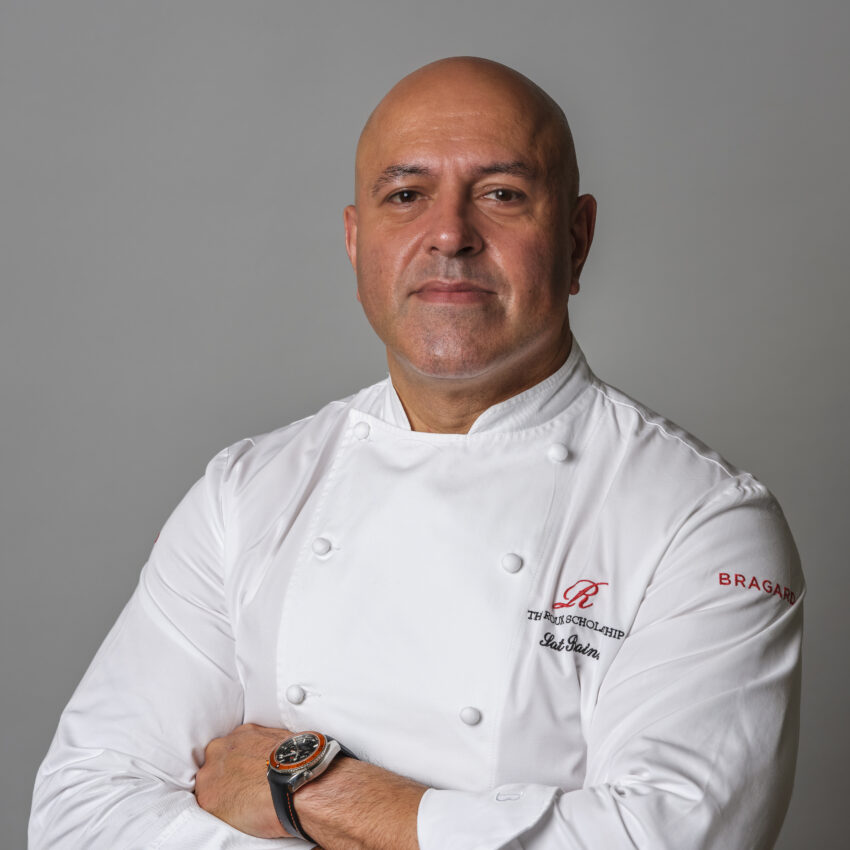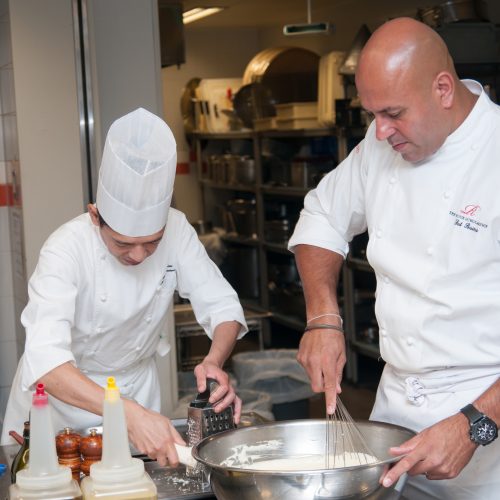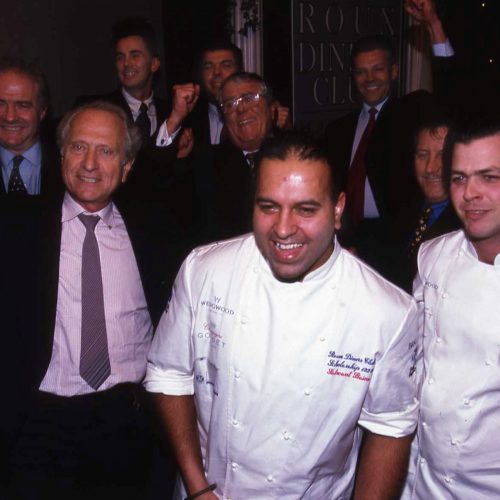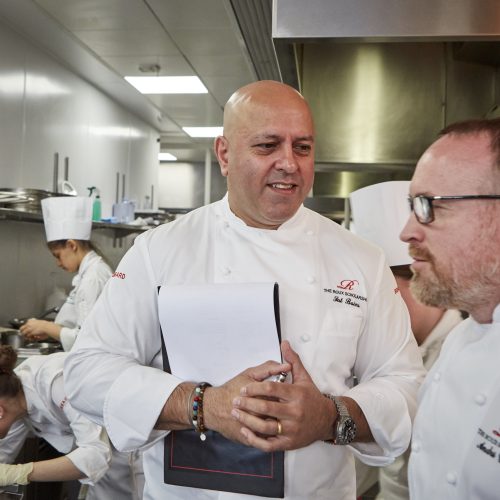1999
Sat Bains
“Don’t give up. Believe in your dreams. Don’t be afraid to fail.”

Sat Bains won the Roux Scholarship in 1999 at the age of 28, it was his first time entering the competition. He staged with Jacques and Laurent Pourcel at Le Jardin des Sens, Montpellier.
Born in Derby to Punjabi parents who had settled in the UK in the late 1960s, Sat’s family ran several newsagents and off-licences. His father engendered a ferocious work ethic, having him up at 4.30am for paper rounds as a teenager, and working after school and at weekends. Although he was expected to continue the family business, Sat enrolled on the catering course at Derby College as a way to forge his own path. He then took a job as a commis chef, at a local hotel-restaurant where his wife-to-be Amanda was working as the restaurant manager.
After reading Marco Pierre White’s book White Heat, and after working with Mick ‘Murphy’ Walton who ignited Sat’s passion for food and creativity, he was inspired to apply for roles at good quality restaurants. In 1996, he took a role with Raymond Blanc setting up his first bistro, Le Petit Blanc, in Oxford working there for six months, followed by three months at L’Escargot in London, while Amanda continued to work in Nottingham.
Put off by the macho atmosphere in London kitchens at the time, he returned to Nottingham and took the role of head chef at The Martin’s Arms in Colton Bassett where he stayed for two years, before taking the role as head chef at an art gallery, which ran a fine-dining restaurant in its tearoom in the evenings. With the artworks changing seasonally, it was an atmospheric setting and the role gave Sat an opportunity to experiment with top quality ingredients, where his cuisine attracted visits from Michelin’s inspectors.
He applied for the Roux Scholarship in 1999. However, in the weeks between the regional finals and the national final, he was told the art gallery café was closing, putting him out of work. With a mortgage and bills to pay, Sat pinned his hopes on winning the scholarship and came up against chefs from Michelin-starred restaurants in the final. He impressed the judges his originality and his seasoning as part of the lamb dish and won.
After his success in the competition, the job offers from the country’s top restaurants came rolling in. Sat’s vision, however, was to create a restaurant where there was no doubt that people were coming for his food and only his food; for that, the setting had to be incongruous with fine dining. He partnered with some Nottingham businessmen who had just taken over a red-brick motel with a French bistro attached to it on the outskirts of the city, after its previous owner had gone bankrupt. In Sat’s eyes, the location - under an expressway flyover near a redundant Victorian canal and next to a pylon - was perfect. It wasn’t long before Sat and Amanda bought out the owners and, in 2003, Restaurant Sat Bains won its first Michelin star; it was the first restaurant in Nottingham to do so. In 2011, they won their second. The restaurant has also garnered the ultimate 5 Rosettes from the AA and 9 out of 10 in the Good Food Guide for several years running.
In April 2011, he was awarded an Honorary Doctor of Professional Practice by the University of Derby for his commitment to hospitality and the culinary arts and Master of Arts, honoris causa by the University of Nottingham in July 2012.
He has made numerous TV appearances including the BBC Great British Menu, the BBC’s Saturday Kitchen, and Saturday Morning with James Martin.
His debut book titled Too Many Chiefs, Only One Indian was released in October 2012 and has since won eight international awards including Best Designed Cookbook at the annual awards of the International Association of Culinary Professionals (IACP) in San Francisco.
In 2015, Sat won the Craft Guild of Chefs’ Special Award, The Catey Chef Award and Restaurant Sat Bains, with rooms coming top of the Sunday Times 100 Restaurants list. In January 2021, Michelin awarded Restaurant Sat Bains their new sustainability award, the green clover mark.
He joined the Roux Scholarship judging panel in 2016.



Where did you do your stage and what was it like?
I really wanted to go to Michel Bra but he’d only just got his third star and wasn’t offering stages, but when I found out Laurent Pourcel had worked for Michel Bra it seemed perfect, so I applied there and they took me on. I felt this strong connection to the area, with the Mediterranean, the fish, the vegetables, the sunshine, it was brilliant. I was the only English person there, I went in on a day I was supposed to be off and realised the Danish guy who was in would speak good English – that was Rene Redzepi - so I said hello and we really connected and became mates. We did loads together, like go and eat at El Bulli. He was living in staff quarters, which was quite tough, but I had an apartment in Castelnau-le-Lez, this gorgeous medieval town along the river. I fell in love with it all: the sun, the green, getting a brilliant set of skills in a three-star restaurant. I got a bike, cycled to work, got really fit - I lost about three stone - and it was great to just go and sit under the plane trees outside the Irish pub and unwind after a shift. Just an amazing time. We went back a few years ago, me and Rene and André Chiang [Taiwanese chef who was head chef at Le Jardin de Sens] and the girls, and we were walking around town and it reminded me of Nottingham, lots of students and lively. It was amazing to think of the difference in me in the 15 years, it completed the circle.
What did you cook in the final?
It was a rack of lamb, French trimmed, cooked with Sauce choron – which is like Béarnaise sauce, with chopped tarragon, tomato concassé or puree added at the end - with a pommes anna with a layer of minced artichokes through the middle. There was a free interpretation with aubergines; most of the others did a caviar d’aubergine - because it was quite fashionable then – but I did a kind of Mediterranean ratatouille with layers of aubergine, basil, thyme and garlic, loads of olive oil, and it went well with the lamb.
How many times did you enter?
I won the first time I entered, but five or six years before I won, I filled out the form but I put in the bin, I just wasn’t ready or confident enough.
What do you remember most about the competition the year you won?
I remember taking a taxi to the Four Seasons, where the final was being held, I saw a billboard ad for FHM magazine which said ‘This year is Pisces’ Man’s year’ and it made the hairs on my neck stand on end, because I’m a Pisces. During the cooking, the desperation I felt was horrendous because I knew how much winning could impact my future. I had read about artichokes the night before, but never prepared them, so I was watching another chef from the corner of my eye and copying him! Just before they announced the winner, I was sitting with my head in his hands, thinking ‘Say my name, say my name.’ And then they said: Satwant Bains. I knew as I walked up to the stage this was the chance. It wasn’t going to happen to me and Amanda again. I had to do something with it.
What advice would you give applicants?
Don’t give up. Believe in your dreams. Don’t be afraid to fail.
Who are your culinary heroes?
I like artists, I take inspiration from form, colour or texture. I don’t want to have the baggage of another chef’s style. That’s why I love Michel Bra: his food is so unique, there is no reference point to it. That’s why, when we cook sweetbreads and puy lentils, we feel free to add lemongrass and cook it as a dahl with Indian spices. All my food is about my journey as a British Punjabi guy, taking inspiration from all over; I travel and I get inspiration from Japan, or wherever. I never want to lose that sense of exploration. My interpretations are that of an immigrant, so I don’t see ingredients in terms of their origin or the traditions of where they come from, I see them in terms of the flavours that work together.
What is it like to be a Roux Scholar?
I’m really proud and humbled and honoured; it’s a responsibility I take seriously and so, when I said yes to being a judge, I knew the calibre of the people who come through it. They know it’s a competition of excellence. Being a Roux Scholar doesn’t define your career, but it opens doors, that’s how I got the restaurant here [in Nottingham].
Tell us about where you are now?
The challenge for me is how do you stay relevant? How to stay interesting so people want to come and eat your food; it’s got to be creative and you’ve got to keep evolving. With social media and Instagram, it’s easy to be fake, but I want to make sure it’s honest, and show the flavours and the effort and the energy that goes into it. The four-day week is the best thing we ever did and we’ve got the garden, and bees – people say our location is shit, but when you taste the honey, you taste the location, and it’s incredible.